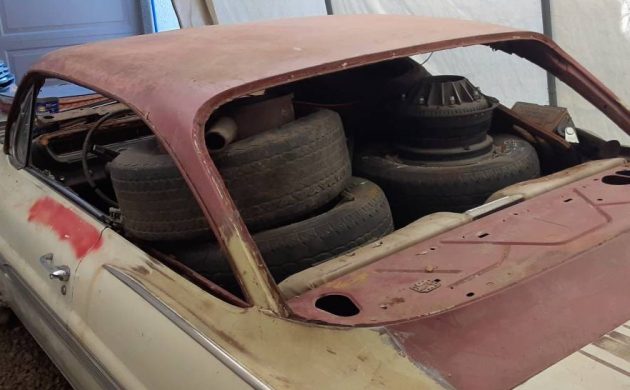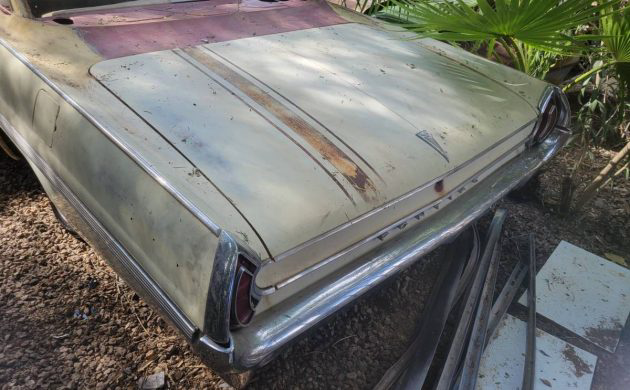Top Swap! 1962 Pontiac Parisienne Bubble Top
There’s a lot going on here with this 1962 Pontiac Parisienne “bubble top” two-door hardtop and there is definitely an interesting turn of events that have occurred. This car has undergone a surprising transformation so let’s dig in and investigate further. Located in Fountain Hills, Arizona, this Poncho is available, here on craigslist for $15,500. Thanks to Larry D for this tip!
The 1962 Pontiac Parisienne, a Canadian-only model, was actually a Pontiac on top and a Chevrolet underneath. In order to escape Canadian tariffs, starting in 1959, Pontiac manufactured cars in Canada with bodies that looked like U.S. models but were modified to attach to Oshawa, Ontario manufactured Chevrolet frames. The result is a Pontiac that has Bonneville trim but has a Chevrolet Impala’s 119″ wheelbase as opposed to Bonneville’s U.S. spec of 123″. Additionally, the Pontiac “wide track” feature was out the window leaving a Pontiac-looking car but with front and rear wheels that were tucked in more tightly than they were on the corresponding U.S. model. The hits continue in the powertrain department where Chevrolet engines and transmissions were employed.
For 1962, GM’s Fisher Body division developed a “folded convertible top look” two-door hardtop that found its way onto B-body models manufactured by Chevrolet, Pontiac, Oldsmobile, and Buick – it was a styling theme that lasted through the ’64 model year and replaced the previous thin C pillar “bubble-top” greenhouse. Chevrolet continued with the bubble top design on a two-door BelAir hardtop in ’62, but that was the last holdout for this distinctive look. And those ’62 BelAir bubble tops are a hit with hot-rodders. Well, if you want something that doesn’t exist, sometimes you have to do it yourself and that’s exactly what the enterprising owner of this Parisienne has done. He has performed a roofectomy, removing the standard folded convertible top steel roof and substituting a bubble top like that used on the aforementioned BelAir. This is the first example of that I have encountered and it appears to be well executed. Apparently, this specific bubble-top roof was lifted from a ’61 Bonneville.
There is no image of the engine but it is said to be a six-cylinder inline unit which means a 150 gross HP, 261 CI “Strato-Six” attached to a Chevrolet two-speed Powerglide automatic transmission. The 261 is a Chevrolet truck motor that was offered between 1954 and 1962 and not used in Chevrolet cars – they relied on a 235 CI engine as their base motor for ’62. There is no reference as to how, or even if, this Parisienne runs.
I can’t tell you what the interior looks like because there are no images or descriptions – there is a ton of stuff piled up in it from what some of the rear body images reveal and there’s an equal smattering of parts in the trunk. What is present and where it needs to go will be a puzzling undertaking for the next owner.
So, odd? In a way, it’s an unusual conversion especially on a car that isn’t fish or fowl, it’s more of a “Pontirolet” – one with a six-cylinder engine that will probably be the first thing chucked by the new owner. So, what are you really getting for $15,500? Well, the seller states, “I HAVE INCLUDED IN THIS PRICE, A SET OF FIVE, YES FIVE with the spare EIGHT LUG PONTIAC WHEELS WITH HUBS and CENTER CAPS and BEAUTY RINGS ( $2000 IF SOLD SEPARATELY FROM CAR DEAL )“. Beyond that, you have the entire matter of fitment issues with the rear glass and side windows among other things, and, of course, that pesky six-cylinder engine…Seems to me that just finding a ’61 Pontiac Bonneville bubble top might have been the better way to go, wouldn’t you agree?
Auctions Ending Soon
 2002 Subaru Impreza WRXBid Now1 days$333
2002 Subaru Impreza WRXBid Now1 days$333
 1975 Chevrolet Corvette ConvertibleBid Now1 days$4,000
1975 Chevrolet Corvette ConvertibleBid Now1 days$4,000
 1964 Ford F-100 Camper CustomBid Now1 days$2,000
1964 Ford F-100 Camper CustomBid Now1 days$2,000
 2006 Jeep Wrangler SportBid Now3 days$11,000
2006 Jeep Wrangler SportBid Now3 days$11,000
 1974 Datsun 260ZBid Now5 days$750
1974 Datsun 260ZBid Now5 days$750







Comments
Nice project. Not so nice price.
This has been for sale on Craigslist for a long time. Probably the price combined with the amount of work scares most people.
Maybe 5500.00 .
It’s not the first ’62 Pontiac I’ve seen with a Bubble Top conversion however it’s the first Canuck version I’ve seen. Just google ’62 Pontiac Bubble Top and one will find more examples. So interesting is such a conversion that even model kit conversion kits are made to replicate this unique look.
https://www.modelroundup.com/product-p/jim-nb114.htm
While I’ll agree the Bubble Top looks great one should be fairly confident in own fab skills before cutting up a usable ’62 HT car + I still think the ‘convertible roof’ looks just as good. As for the 261 it was offered in Canuck Pontiacs in the ’55-’62 time frame and apparently was unique for the Canadian market in that it had hydraulic lifters
Also; while the seller is kind enough to include the 8lugs I’d be more than curious to learn how he had planned to install them on Chev axles…
oops I made a big mistake. I’ll just sell it.
Actually, I’m surprised, with the popularity of the “bubbletop”, we didn’t see more of these. The “bubbletop” itself is a bit of a mystery, perhaps someone can clear it up, but I’ve seen ’59 Pontiac 2 doors with “bubbletops”, as part of the 1959 restyle. My uncle had a ’61 Ventura 2 door bubbletop, and at the time, it was nothing special, that I remember and they sat rusting in junkyards right next to the regular roof ones. In fact, I seem to remember, there was a bit of a kerfuffle with bubbletops, claiming, with the thin roof pillars, they weren’t as safe in a rollover. Like every Chevelle has a 4 speed today, all you see are “bubbletops”, when, aside from my uncles, I hardly remember seeing them. This car seems like a composite of many cars. Good luck with that. Be kind of fun watching some new Autoplace employee trying to find THIS on their screens. “A what now”?
The term ‘Bubble Top’ was never officially used by GM and apparently car guys didn’t even talk about ‘bubble tops’ until the ’62 BelAir sport coupe came around or later, so to differentiate it from the new-for-62 ‘convertible roof’.
While there are guys that will include ’59-’60 GM 2dht as ‘bubble tops’ (heck even ’60-’61 Starliners!), it’s commonly regarded today that it’s only rightfully applied to ’62 BelAir + any ’61 Chev, Pontiac, Olds or Buick B-body sport coupe. Back in ’61 there was nothing special about it as this is the roofline you got when you ordered a 2dht…
15 k for a project car?? I’m betting you can get a nicer driver for that price
Wouldn’t it be nice if these putz wanna be “car owners” would not take good cars apart and just leave their mess for someone else? And to make it worse they then price them as if the car was up & running! Frustrating!!
Interesting conversion indeed, and a good write up on the Canadian cars, vs. the US brethren. There were a great many trulygrest Canadian Pontiacs over the years, which carried engines as large as the 40, 427 and 454 engines. I should note here, however that the Canadian variants were made much much earlier than the 5 model year. Not only were the wheelbases different, so was much pop the sheet metal. The bodies on thew Canadian Pontiacs were identical looking to the US models, but were much shorter. That combined with lower numbers produced, and the harsh Canadian winters have fooled many a person wanting to restore a Canadian car using a good rust free southern hood, trunk lid, fender or quarter panel only to find that nice Arizona metal was 4 inches longer than that off the Canadian car. The variations in the cars predates 15 a long long way. Consider a 1939 Chevrolet had the “top hat” style frame while the Pontiac had the channel frame… The Canadian Pontiacs shared the dimensions as well as the Chevrolet frame for ’39. The Pontiacs too shared the Chevy OHV sixes while the Pontiacs had the flathead sixes in the thirties… Many Many differences in the two cars indeed.
Why would any one want a full size poncho with a six cylindermakes no sense at all
I have spoken to this Old Man for Maybe as long ago as 12 or 14 years ago when at that time it was a Project he had done years before. yet never finished as he had done with other Conversions. as I know of others.
One he turned a 2 door 59 Chevy Stationwagon into an El Camino and was so Proud to insist he did it exactly as the “Factory Built 59 El Camino’s” Oh Lovely.!! Except, that 2 door Wagon was way more rare and Desirable, and was Inflawless condition>>—-> I was shaking My Head Say what??
I must admit id Like to Own a few of his Projects, But he’s rather Proud of all of them too. as Is reflected In His 10 to 12,000 grand-o-so’ Pricing.
And when it’s that far apart. it gets awkward to hit this Very Proud Nice old Man with those real realities.
The comment ” I know what I have” always reminds me of my Father. He was into the NOS parts collecting when everyone thought he was wasting his money. So, when things hit the upward trend and guys like Bill Harrah started calling he made sure everyone paid homage to his “genius” and paid accordingly. I will admit that I never expected this hobby to blossom into an industry with everyone having a passing interest or knowledge. BAT? I don’t think the guy who started it predicted what it has become. I’m glad for blue collar adherents like BF’s who, hopefully, make a living while enjoying the ride. Reminds me of all the Essex guys who came around on Saturday nights trying to get their project running by morning. We’ve come a long way.
Perfect car to drive if you want bugs in your teeth.
My first car was a 61 with the 8 lug wheels. I was 17 and one day I cut school and just went for a drive.
Out in the middle of nowhere, I had a flat. I’d never changed a tire before. Jacked it up and I couldn’t get the lug nut to move.
Got out the manual. The left and right wheels were threaded differently. Let’s say the right hand lug nuts loosened to the left. So I did that and couldn’t get it to budge.
Gave it everything I had and I broke the lug nut off.
Didn’t know what to do so I drove 20miles on the rim to the next town and had them change it.
Somebody had put the left wheels on the right side. So I should have been loosening it to the right.
All these years later I would have looked at the broken stud or at the stud in the lug and realized that, but I was just a kid.